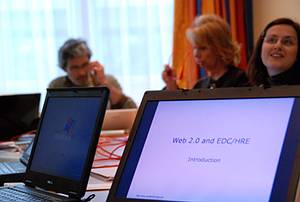Web 2.0: we have all heard the term in recent years being preached by internet gurus, media specialists and pundits of the like. But what does this new digital revolution actually encompass, and more importantly, how can we benefit from its advantages? Thirteen enthusiastic participants, laptop at the ready, ventured out on a digital quest taking them from social bookmarking to online desktops and back.

“This is my office that I established this year”. Professor Wolfgang Schumann of the University of Tübingen proudly shows his working area to the participants of his workshop. No mahogany desk, comfortable chair or bulging bookshelves in Professor Schumann’s office though. Instead we see the predominantly white interface of Igoogle. “The web is my desktop, I only use web-based applications”, explains Schumann.
The benefits of working with online applications are numerous: “There is of course the huge financial advantage with regards to license fees that you normally have to pay for office software”, says Schumann. Especially for cash-strapped NGO’s this can mean a big difference, enabling them to direct the funds that are saved to more pressing needs.
Secondly there are the extraordinary possibilities for collaboration, regardless of the location of the people or organizations involved: “Web 2.0 has created unprecedented possibilities for worldwide cooperation and exchange of information.” For the workshop participants, all active in the field of human rights and civic education – often on an international level – this makes life a lot easier. “Collaboration between individuals and organizations that are working on the same topics is therefore much more efficient than before”, adds Schumann.

A third advantage of Web 2.0 applications is that there is no local storage of information involved. “Whereas in the past I would have my files scattered across different computers, now I can just access all of my documents from every computer with internet access. But, more importantly, this also means that I can grant other users access to the same files, enabling us to work on the same projects and documents at the same time”, says Schumann.
And that is just what the workshop participants set out to do. With the support of Professor Schumann, all of them signed up to the free online office suite zoho.com. “This is part of what we call a blended-learning event”, says Schumann. “The workshop doesn’t end here, all of the participants will continue online. We have established an online platform where everyone can ask questions and exchange experiences.” It’s an initiative that fits the new internet’s philosophy, or as Professor Schumann puts it: “Web 2.0 is not about technology, it’s about a new state of mind, one of collaborating and sharing with others.”
Posted in 2008-11: DARE conference| 16.11.2008
By: Yannick Brusselmans



